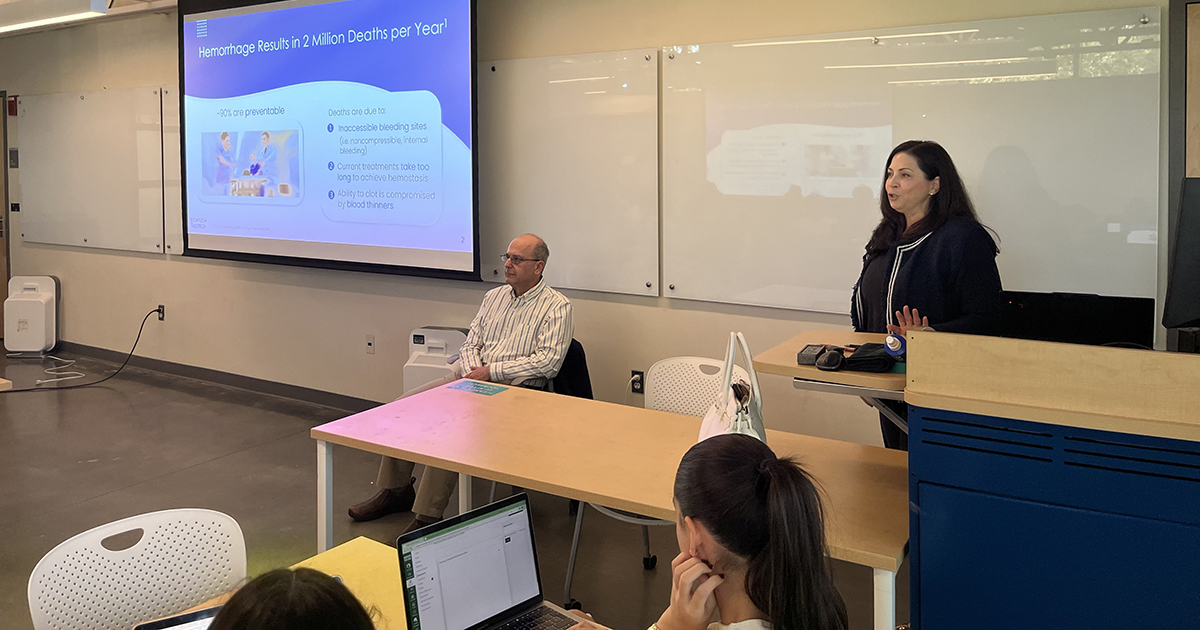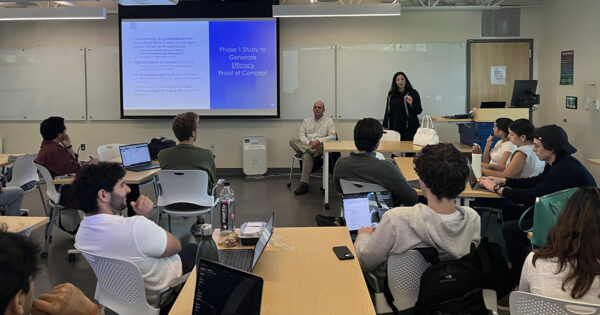Science Meets Capital: Inside Boston’s Biotech Innovation Scene

Editor’s note: The New Tech Ventures Blog is produced by students in the New Technology Ventures course, taught by Assistant Professor of Practice Stephen Brand. The course features tech leaders and entrepreneurs as weekly guest speakers, and students are sharing their insights on the ventures and the experience. This post was written by the team of Cole Davenport ’25, Jolie Rojik ’25, and Gleb Slavinskiy ’25.
Few business ventures have the potential to directly save lives. Our New Technology Ventures class at Babson College recently gained insight into one such opportunity, experiencing the unique dynamic between an investor and their portfolio company founder.
Angel investor Ben Littauer and Cayuga Biotech CEO Andrea Ashford-Hicks took an unconventional approach to their presentation. Rather than delivering separate talks, they created an interactive session where Littauer invited Ashford-Hicks to pitch to our class as if we were potential investors. As the only biotech presentation in our speaker series this semester, this session provided a valuable perspective on how scientific innovations move from concept to market.
Cayuga Biotech addresses a critical medical challenge: hemorrhage-related deaths, of which 90% are preventable. Ashford-Hicks clearly explained their product CAY001, an optimized polyphosphate formulation that accelerates natural clotting processes. Her ability to communicate complex scientific concepts to a general audience demonstrated the importance of clear communication in startup leadership.
The interplay between Littauer and Ashford-Hicks revealed the nuanced relationship between investors and founders. Littauer’s occasional questions and Ashford-Hicks’ responses showed how successful partnerships in biotech require alignment in both business strategy and core values.

The Importance of Alignment
Littauer offered a refreshing perspective on investment decisions in health care. While acknowledging the importance of financial returns, he emphasized that the potential to save lives influences investment choices. This blend of business and social impact particularly resonated with our class’ entrepreneurial aspirations.
Ashford-Hicks’ background includes leadership roles at Johnson & Johnson, Pfizer, and Merck. Her transition to startup leadership, motivated partly by seeing how medical innovations had helped her own family member, illustrated how personal experience often drives entrepreneurial ventures.
The three main insights we took from their presentation:
- Innovation requires patience in regulated industries. Cayuga’s planned market entry in 2027 shows the long-term planning needed in biotech development.
- Intellectual property protection matters. Cayuga’s seven patents demonstrate how protecting innovations is crucial in sectors with high development costs.
- Strategic team building drives success. Cayuga’s current two-person team, with plans to expand thoughtfully during clinical trials, exemplifies efficient scaling in a capital-intensive industry.
The session highlighted that successful biotech entrepreneurship needs more than innovative technology or adequate funding. It requires alignment between investors and founders who share both business goals and a commitment to positive impact.
For Babson students interested in entrepreneurship, particularly in transformative sectors like biotech, this presentation offered practical insights into building ventures that balance profit with purpose. The session demonstrated how scientific innovation, market opportunity, and strategic investment can work together to create meaningful impact.
Posted in New Tech Ventures Blog






